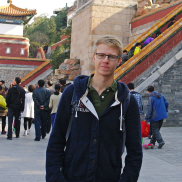
XJTLU makes China accessible for international exchange students no matter your study interest. With curriculum all taught in English, study areas include sciences, technology, engineering, mathematics, architecture and design, communications, media, business, humanities and social sciences – all combined with Chinese language and in-depth study of China, taught by some of Asia’s foremost experts.
You’ll have the opportunity to explore China’s vast and varied landscapes, ancient cultures and dynamic economic development from a prime location in the heart of China’s booming eastern corridor.
Study in English and learn Chinese. With both languages you are globally mobile and highly employable.
China represents a world of ideas and values built on one of the world’s oldest cultures. You’ll gain a new perspective on your own life and of those around you.
Studying abroad is fun! You’ll have new experiences and make friendships in China and with people from across the globe that will last a lifetime.
Develop an understanding of the world’s second largest economy and largest consumer market.
Blending one of Asia’s leading research and innovation hubs, a quirky old town with canals and willow-filled lanes, and a glitzy new town, Suzhou is a curious mix of the ancient and the hypermodern. Connected by bullet train to the centre of Shanghai and Beijing you will have a chance to experience the pulsing heart of east Asia.
Students from one of our partner institutions listed below can apply for one semester or one academic year as an exchange student. Please contact the study abroad office at your university for more information about the opportunities available.
| PARTNER | COUNTRY |
|---|---|
| University of Technology Sydney | Australia |
| University of Wollongong, Australia | Australia |
| University of New Soutd Wales | Australia |
| RMIT University | Australia |
| La Trobe University (LTU) | Australia |
| Daffodil International University | Bangladesh |
| Artevelde University of Applied Sciences Ghent | Belgium |
| Tdomas More University of Applied Sciences | Belgium |
| KU Leuven | Belgium |
| Univertsity of Bonja Luka (UBL) | Bosnia and Herzegovina |
| Beijing Foreign Studies University | China |
| HEC Montreal | Canada |
| Ontario Jiangsu Exchange (https://www.yorku.ca/ouinternational/ojs-ontario-u… (Updated in March 2021)) |
Canada |
| Laurentian University | Canada |
| The University of Calgary | Canada |
| Ryerson University | Canada |
| Simon Fraser University | Canada |
| McGill University | Canada |
| University of Waterloo | Canada |
| Masaryk University | Czech Republic |
| Prague University of Economics (VŠE) | Czech Republic |
| University of Turku | Finland |
| Abo Akademi University(AAU) | Finland |
| Emlyon Business School | France |
| NEOMA business school | France |
| Paris Graduate School of Digital Innovation (Epitech) | France |
| Sciences Po Strasbourg | France |
| EM Normandie Business School | France |
| NEU-ULM | Germany |
| DHBW Mosbach | Germany |
| WHU (Otto Beisheim School of Management) | Germany |
| ALBA Graduate Business School, the American College of Greece | Greece |
| BINUS | Indonesia |
| University of Indonesia | Indonesia |
| Trinity College Dublin | Ireland |
| Politecnico di Torino | Italy |
| University of Venice Ca’Foscari | Italy |
| University of Bergamo | Italy |
| University of Siena | Italy |
| University of Milan(UNIMI) | Italy |
| Ritsumeikan Asia Pacific University (APU) | Japan |
| UMAP | Japan |
| Sophia University | Japan |
| University of International Business Almaty | Kazakhstan |
| Taylor’s University | Malaysia |
| University of Guadalajara | Mexico |
| Tecnológico de Monterrey | Mexico |
| Hague University of Applied Sciences | Netderlands |
| University of Groningen | Netderlands |
| University College Utrecht | Netderlands |
| Eindhoven University of Technology | Netderlands |
| BI Norwegian Business School | Norway |
| Nordic Center | North Europe |
| Higher School of Economics | Russian |
| University of Cape Town(UCT) | South Africa |
| Utah University Asia Campus | South Korea |
| Sungkyunkwan University | South Korea |
| University of Seoul | South Korea |
| University of Technology, Arts & Design (U-TAD) | Spain |
| IQS | Spain |
| Universidad Pontificia de Salamanca (UPSA) | Spain |
| Comillas Pontifical University / universidad pontificia comillas de madrid | Spain |
| Universidad Politécnica de Madrid | Spain |
| Mahidol University | Thailand |
| Chulalongkorn University | Thailand |
| Middle East Technical University(METU) | Turkey |
| Sabanci University | Turkey |
| Atilim University | Turkey |
| University of Leeds | UK |
| University College London | UK |
| University of Stirling | UK |
| SAF | USA |
| University of Texas at Dallas | USA |
| University of Pennsylvania College of LPS | USA |
| San Francisco State University | USA |
| Boston University | USA |
Students normally study 20 credits per semester. Choose your modules (also known as classes or courses at other universities) in order of preference when you submit your selections to XJTLU. Please look at our module catalogue (please notice the information in the link might subject to change according to XJTLU timetable yearly updates) and specifications. Your module selections should be approved by your home university before you submit them to XJTLU. An exchange student can study a maximum of one Chinese Language module (CLT module) per semester. Physical Education (PHE) modules are not available for exchange students.
You should apply for more modules than you need (we strongly recommend 40 credits per semester), in case we are unable to confirm your first choice because of timetabling clashes and/or module changes.
The first number in the module code refers to the undergraduate level at XJTLU (0, 1, 2, and 3). Undergraduate degree courses at XJTLU are four years with general education covered in level zero. Degree-specific content is taught at levels one, two and three according to the typical three-year model in England, Wales and Northern Ireland.
Degree programmes
| XJTLU | ENGLAND, WALES AND NORTHERN IRELAND | CHINA |
|---|---|---|
| Level 0 | Year 1 | |
| Level 1 | Year 1 | Year 2 |
| Level 2 | Year 2 | Year 3 |
| Level 3 | Year 3 | Year 4 |
| Level 4 | Master | Master |
Note: The first number for masters module codes is four. The first number for non-credit-bearing modules is nine. Level 0 modules are not available for exchange students. Masters modules are not available for undergraduate students.
Exchange students can also take advantage of summer school programmes focused on Chinese language and social change in China, as well as postgraduate programmes.
Exchange students should apply through their home institution’s study abroad office. The home university will then nominate students to XJTLU. After receiving the list of nominated students, XJTLU will invite each student to complete an application form. An example of application deadline is listed:
Deadlines for autumn semester start
Deadlines for spring semester start
Once exchange students have accepted the offer letter, the original copy of JW202 Form and Admissions Notice will be posted to the Study Abroad Office at your home institution. With these documents, you will be able to apply for a China student visa (X visa) at your local embassy/consulate.
For more information on the visa application process.
Once exchange students have accepted the offer letters, the XJTLU Global team will book accommodation for students.
For more information about accommodation.
Exchange students pay tuition fees as normal to their home institution.
Exchange students should first contact their university’s study abroad office. Additional questions can be addressed to the XJTLU Study Abroad Office at studyabroad@xjtlu.edu.cn.

